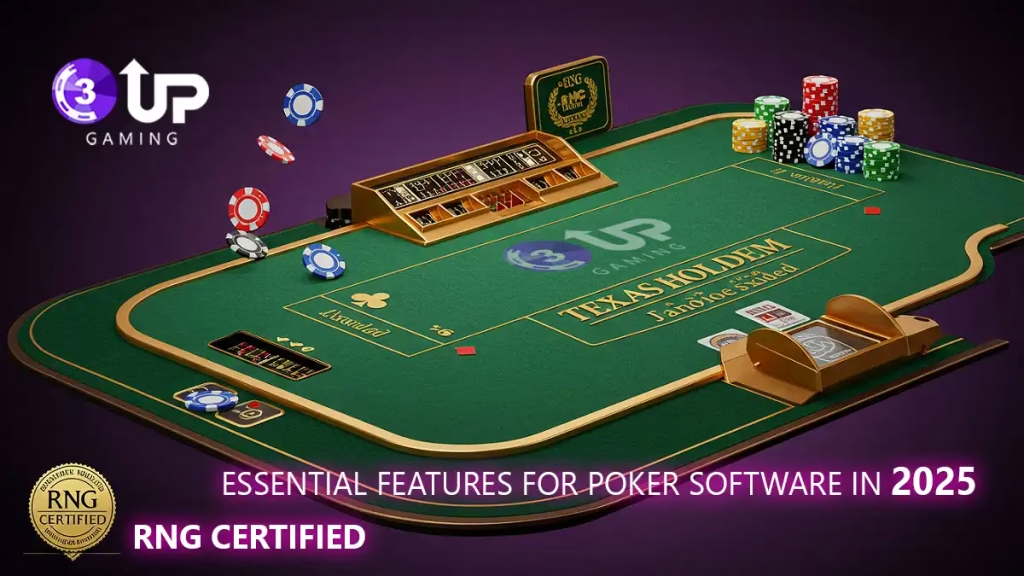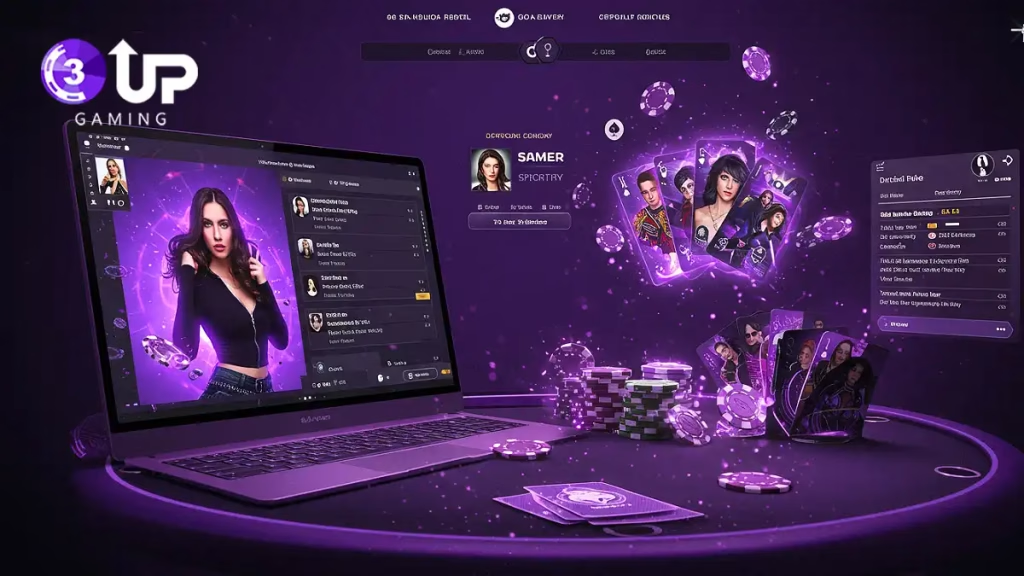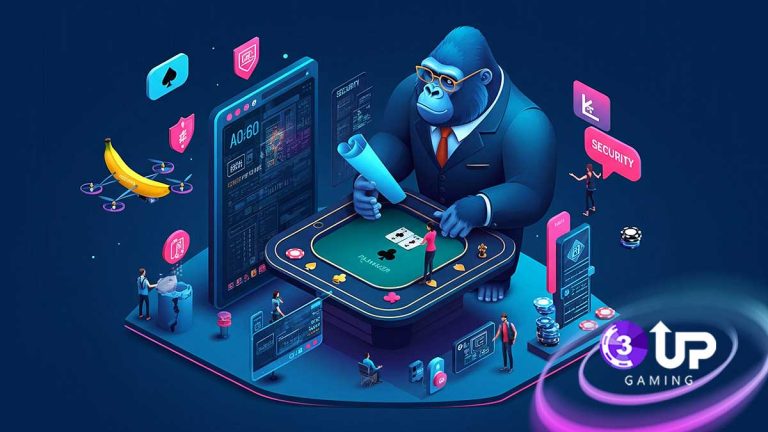How Custom Poker Software Development Elevates Your Gaming Brand in 2025? Players ditching your poker site for smoother rivals? Generic software could be the issue. Custom poker software development creates platforms tailored to your brand, boosting retention with unique features. With online poker revenue projected to reach $103 billion by 2027 (Statista), differentiation is key. This guide details why bespoke poker game engines are essential, from core features to global scaling. Learn how to build a standout platform for 2025’s competitive market.
What Makes a Poker App Trustworthy in 2025?
In 2025, a trustworthy poker app stands out through a combination of security, transparency, and user satisfaction. Advanced encryption and fair-play algorithms ensure every hand is dealt randomly and securely, protecting players from cheating or data breaches. Trusted apps also maintain clear policies, verified payment systems, and responsive customer support. Positive user reviews, licensing from reputable gaming authorities, and regular software updates are key indicators of credibility. Most importantly, a reliable poker app creates a smooth, bug-free experience that prioritizes both player integrity and game enjoyment.
Why Invest in a Tailored Poker Platform?
White-label poker platforms save costs but lack flexibility. They can’t match your vision, losing players to competitors. Custom poker software development gives you control over Texas Hold’em variants or rake structures. Costs range from $50,000 to $400,000, but GGPoker’s tailored tournaments show how personalization retains players.
A generic platform feels forgettable. Custom software builds a distinct vibe, like CoinPoker’s crypto focus, unlike cloned white-label poker. Target niches, such as Omaha fans, with pot odds tools. This branding fosters loyalty, ensuring your real money poker site shines against PokerStars’ templates.
| Advantage | Custom Platform | White-Label Platform |
| Customization | Full feature control | Limited tweaks |
| Branding | Unique identity | Generic look |
| Retention | High via tailored UX | Low due to sameness |
This table shows why custom platforms excel: they reduce churn. Tailored features can lift retention by 25%, per H2 Gambling Capital, driving revenue.
Essential Features for Poker Software in 2025

Players expect seamless Texas Hold’em or Seven Card Stud globally. A custom poker game engine delivers this with low-latency servers. Certified Random Number Generators (RNGs), like 888poker’s audited systems, ensure fair hands. Without RNGs, players suspect rigging, harming your real money poker site’s credibility.
Mobile drives 60% of poker sessions (Statista). Custom software supports iOS and Android, plus chat or leaderboards for community vibes. Over-automation risks a cold feel, so add live events. These features enhance engagement, making your online poker platform security a player favorite.
Outperforming Rivals with Custom Solutions
Having explored core features, let’s see how they give you an edge. Custom poker software stands out in a crowded market, unlike white-label poker that blends in.
Competing with WSOP Online? Custom platforms target niches, like CoinPoker’s crypto fans with blockchain payouts. Offer Short Deck games or low-rake tables. This originality draws players from generic platforms, boosting real money poker site scalability and market share.
Custom servers handle 15,000 players in freeroll tournaments, avoiding crashes. Maintenance costs 10% of your budget yearly. Features like gamified rewards or Arabic tables make your online poker platform security a go-to, ensuring players choose you over rivals.
Read More: Top Online Poker Software Developers: Custom Solutions for Real Money & Social Gaming!
Seamless Cross-Platform Experience
Cross-platform play is non-negotiable. Players demand flexibility, and custom software delivers it seamlessly.
Players switch from iPhone to PC mid-hand. Custom poker software syncs chips and avatars, like PokerStars’ app. This boosts engagement but requires skilled coders for iOS and web frameworks. A smooth experience drives real money poker site scalability in 2025.
A single codebase for mobile, web, and desktop speeds updates. Players get consistent bet sliders everywhere. Optimizing for Chrome or Android raises costs, but a glitch-free platform lifts session times, strengthening your online poker platform security.
Cryptocurrency and Secure Payments

Payment systems are critical for trust. Custom platforms offer flexible, secure options to meet player needs.
Crypto is reshaping poker. Custom platforms integrate Bitcoin or USDT, like CoinPoker, with blockchain for transparency. This draws 20% of players (Statista), but KYC/AML compliance is complex. Legal expertise ensures your real money poker site avoids regulatory issues.
Fiat gateways like Skrill support global players. Encryption secures transactions. Cross-chain payments, like Polygon’s Layer-2, are emerging, but upgrades cost. Offering crypto and fiat makes your online poker platform security inclusive for casuals and high rollers.
Building Your Custom Poker Platform
Launching a platform requires careful planning. Here’s how to execute it effectively.
Define your audience, Omaha pros or Five Card Draw casuals? Hire a dev team with poker game engine expertise. A coder I know struggled with RNG audits, and planned early. Set goals, like AI-driven rake tweaks, for real money poker site alignment.
Build wireframes, code features, and beta tests to catch UX flaws. Launch with a freeroll to draw 15,000 users (H2 Gambling Capital). Expect 6-18 months and $400,000, but a custom platform outshines white-label poker in real money poker site scalability.
Navigating Development Challenges
Development isn’t smooth sailing. Addressing challenges ensures long-term success.
Custom poker software costs $50,000-$400,000. Malta licenses add legal fees. GDPR compliance, vital in Europe, demands audits. A startup’s non-compliance led to closure. Budget for these to keep your online poker platform security penalty-free.
Unlike white-label poker, custom platforms need updates for bugs or VR tables. Allocate 10% of your budget yearly. GGPoker’s patches keep it competitive. Maintenance ensures your real money poker site stays reliable, retaining players long-term.
Measuring Success with KPIs
Tracking performance is key. KPIs reveal what’s working and what needs tweaking.
Daily Active Users (DAU) and 90-day retention, aim for 45%, gauge success. PokerStars tracks DAU to spot dips. Low retention signals UX issues, like slow payouts. X feedback guides tweaks, ensuring real money poker site scalability keeps tables active.
Average Revenue Per User (ARPU) measures monetization. Stablecoins lift ARPU by 15%. Google Analytics tracks drop-offs, like clunky menus. Reddit reviews reveal pain points, helping your online poker platform security evolve for player satisfaction.
Localization for Global Markets
Going global requires cultural and legal adaptation. Custom software makes it possible.
Custom software supports Hindi or Arabic tables, tapping India’s 30% yearly poker growth (Statista). PokerStars’ multi-language UI widens reach. Localization raises costs but boosts traffic for real money poker sites, expanding your global footprint.
India’s skill-game laws differ from the UK’s KYC rules. Custom platforms adapt, but legal consults cost. Compliance prevents bans, as one platform learned after a UK fine. A compliant online poker platform security scales without legal issues.
Gamification to Drive Engagement
Gamification keeps players invested. Custom software makes it strategic and balanced.
Gamified rewards, like GGPoker’s badges, boost sessions by 12%. Custom software adds missions or leaderboards. Overloaded rewards distract, so keep them simple. Engaged players promote your real money poker site, driving organic reach on X.
Gamification shouldn’t overwhelm. A platform’s cluttered pop-ups tanked retention. Custom software fine-tunes rewards, like freeroll entries for bluffs. This ensures your online poker platform security retains players without disrupting their game focus.
Designing a Memorable UI/UX

A strong UI/UX defines your platform’s appeal. Custom design creates lasting impressions.
Custom UI/UX crafts a unique vibe, GGPoker’s sleek menus or a retro casino feel. Fast load times, under 2 seconds, keep players focused. Design costs $50,000 or more, but a standout interface drives buzz for real money poker sites on X.
Let players customize avatars or table themes, as PokerStars does, boosting sessions by 12%. Complex UX risks confusion, so keep navigation simple, two clicks to tournaments. A polished UI makes your online poker platform security a player favorite.
Player Acquisition Strategies
Drawing players is critical. Custom platforms enable targeted acquisition efforts.
Custom platforms support X influencer streams or targeted ads, like 888poker’s pro endorsements. These spark 10,000 sign-ups in weeks (iGaming Business). Ad spend hurts, but precise campaigns lift your real money poker site’s visibility and growth.
Freerolls, free tournaments, draw crowds. Custom software hosts branded events, like WSOP’s online series. Budget for prizes and marketing. A freeroll can boost retention by 20%, turning newbies into regulars on your online poker platform security.
Regulatory Deep Dive
Compliance is a make-or-break factor. Custom platforms navigate complex regulations.
Licenses like Malta’s cost $50,000-$100,000, plus audits. Non-compliance risks shutdowns, as a 2024 platform learned. Custom software adapts to local laws, ensuring your real money poker site operates legally across markets with robust compliance.
KYC/AML rules fight fraud but complicate crypto payouts. Custom platforms integrate ID checks, like PokerStars’ systems, taking months to set up. Compliance builds trust, letting your online poker platform security handle high-stakes players safely.
Monetization Models
Smart monetization maximizes revenue. Custom software offers flexible options.
Rake, fees per pot, drives revenue. Custom software tweaks rake for cash games, like GGPoker’s low-rake tables. High rakes deter players, so balance is key. Optimized rakes lift revenue by 10% for real money poker sites.
Custom platforms offer avatar skins or premium tables, like 888poker’s VIP perks. Microtransactions add 5% to ARPU. Overpricing risks pushback, so test pricing. A balanced model ensures your online poker platform security monetizes effectively.
Data Privacy in Poker Platforms
Data privacy builds trust. Custom platforms prioritize player security.
GDPR compliance, mandatory in Europe, requires data encryption and audits. Non-compliance fines reach $20 million. Custom software secures player data, like PokerStars’ protocols, ensuring your real money poker site avoids legal and reputational risks.
Transparent data policies, like opt-in tracking, reassure players. A 2024 platform lost users over data leaks. Custom software implements consent tools, strengthening your online poker platform security and fostering loyalty among privacy-conscious players.
Player Retention Tactics
Retention is the backbone of success. Custom software drives long-term loyalty.
Custom platforms use AI to offer tailored freerolls based on bluff patterns. PokerStars’ targeted promotions lift retention by 15%. Over-automation risks a robotic feel, so blend with human touches, ensuring real money poker site engagement.
Player surveys or X feedback reveal pain points, like slow payouts. Custom software integrates feedback tools, like 888poker’s forms. Addressing concerns boosts retention, making your online poker platform security a trusted hub for players.
Read More: Top Poker Software Features for 2025: Your Ultimate Guide to Winning Big!
Community Building for Loyalty
A strong community keeps players invested. Custom software fosters connection.
Custom software hosts forums or live events, like PokerStars’ community nights. These boost retention by 15%. Moderation takes time, but engaged players promote your real money poker site on Reddit, driving organic traffic.
Tiered rewards, like GG Poker’s bonuses, keep players invested. Custom software tracks play for tailored perks, like freeroll entries. Clear tiers avoid confusion, ensuring your online poker platform security retains high rollers and casuals.
Future Trends in Poker Software
Emerging tech shapes poker’s future. Custom platforms stay ahead of the curve.
AI spots bluff patterns, offering tailored freerolls, but risks robotic vibes. A 2024 platform’s AI chat failed for seeming fake. Custom software blends AI with live dealers, boosting retention for real money poker sites in 2025.
VR poker tables and cross-chain payments, like CoinPoker’s blockchain, draw tech-savvy players. R&D costs hurt, but early adoption makes your poker game engine a 2025 leader, enhancing online poker platform security and traffic.
Conclusion
Custom poker software development unlocks a premier gaming brand in 2025’s $103 billion market. Despite $400,000 costs and compliance challenges, tailored platforms with slick UI, crypto payouts, and gamified rewards outshine white-label poker. Localize, monetize wisely, and leverage AI to lead the industry. Start building your bespoke real money poker site today.
FAQ: How Custom Poker Software Development Elevates Your Gaming Brand in 2025?
What is custom poker software development?
It’s crafting a poker platform tailored to your brand with unique games and UI. Unlike white-label poker, it offers control, enhancing retention via real money poker site scalability and personalized features like freerolls.
Why choose custom over white-label poker platforms?
Custom platforms provide unique branding and scalability, unlike generic white-label solutions. They adapt to trends, reducing churn with experiences exclusive to your real money poker site, boosting loyalty.
How long does custom poker software take to develop?
Expect 6-18 months, based on features like AI or crypto. Complex platforms need extra time for testing and compliance, ensuring online poker platform security and top performance.
Can custom poker software support cryptocurrency?
Yes, it integrates Bitcoin or USDT with blockchain for secure payouts. Fiat options like Skrill add flexibility, but KYC/AML compliance is vital for real money poker sites.
What devices are compatible with custom poker platforms?
They support mobile (iOS, Android), web, and desktop with responsive design. Seamless switching, like PokerStars’ app, drives engagement for real money poker site scalability.
Is custom poker software scalable for large tournaments?
Optimized servers handle thousands in WSOP-style events, ensuring lag-free play. Updates maintain online poker platform security, keeping performance tight for real money poker sites.
How do I ensure poker platform compliance?
Hire legal experts for licenses (e.g., Malta) and KYC/AML audits. Compliance prevents shutdowns, safeguarding your real money poker site’s operations and player trust globally.
What are the costs of custom poker software development?
Costs range from $50,000-$400,000, depending on features like VR or AI. Licensing and maintenance add 10% yearly, but real money poker site scalability drives ROI.
How does gamification improve player retention?
Gamified rewards, like badges or missions, boost sessions by 12%. Custom software tailors perks, ensuring online poker platform security retains players without overwhelming their gameplay.
What role does localization play in poker platforms?
Localization, like Hindi tables, taps markets like India, growing 30% yearly. Custom software adapts to laws, ensuring real money poker site scalability and global traffic.


